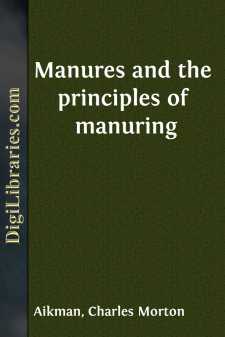Categories
- Antiques & Collectibles 13
- Architecture 36
- Art 48
- Bibles 22
- Biography & Autobiography 813
- Body, Mind & Spirit 142
- Business & Economics 28
- Children's Books 14
- Children's Fiction 11
- Computers 4
- Cooking 94
- Crafts & Hobbies 4
- Drama 346
- Education 46
- Family & Relationships 57
- Fiction 11829
- Games 19
- Gardening 17
- Health & Fitness 34
- History 1377
- House & Home 1
- Humor 147
- Juvenile Fiction 1873
- Juvenile Nonfiction 202
- Language Arts & Disciplines 88
- Law 16
- Literary Collections 686
- Literary Criticism 179
- Mathematics 13
- Medical 41
- Music 40
- Nature 179
- Non-Classifiable 1768
- Performing Arts 7
- Periodicals 1453
- Philosophy 64
- Photography 2
- Poetry 896
- Political Science 203
- Psychology 42
- Reference 154
- Religion 513
- Science 126
- Self-Help 84
- Social Science 81
- Sports & Recreation 34
- Study Aids 3
- Technology & Engineering 59
- Transportation 23
- Travel 463
- True Crime 29
Manures and the principles of manuring
Categories:
Description:
Excerpt
PREFACE.
When the present work was first undertaken there were but few works in English dealing with its subject-matter, and hardly any which dealt with the question of Manuring at any length. During the last few years, however, owing to the greatly increased interest taken in agricultural education, the demand for agricultural scientific literature has called into existence quite a number of new works. Despite this fact, the author ventures to believe that the gap which the present treatise was originally designed to fill is still unfilled.
Of the importance of the subject all interested in agriculture are well aware. It is no exaggeration to say that the introduction of the practice of artificial manuring has revolutionised modern husbandry. Indeed, without the aid of artificial manures, arable farming, as at present carried out, would be impossible. Fifty years ago the practice may be said to have been unknown; yet so widespread has it now become, that at the present time the capital invested in the manure trade in this country alone amounts to millions sterling. It need scarcely be pointed out, therefore, that a practice in which such vast monetary interests are involved is worthy of the most careful consideration by all students of agricultural science, as well as, it may be added, by political economists.
The aim of the present work is to supply in a concise and popular form the chief results of recent agricultural research on the question of soil fertility, and the nature and action of various manures. It makes no pretence to be an exhaustive treatise on the subject, and only contains those facts which seem to the author to have an important bearing on agricultural practice. In the treatment of its subject it may be said to stand midway between Professor Storer's recently published elaborate and excellent treatise on 'Agriculture in some of its Relations to Chemistry'—a work which is to be warmly recommended to all students of agricultural science, and to which the author would take this opportunity of acknowledging his indebtedness—and Dr J. M. H. Munro's admirable little work on 'Soils and Manures.'
In order to render the work as intelligible to the ordinary agricultural reader as possible, all tabular matter and matter of a more or less technical nature have been relegated to the Appendices attached to each chapter.
The author's somewhat wide experience as a University Extension Lecturer, and as a Lecturer in connection with County Council schemes of agricultural education, during the last few years, induces him to believe that the work may be of especial value to those engaged in teaching agricultural science.
He has to express the deep obligation he is under, in common with all writers on Agricultural Chemistry, to the classic researches of Sir John Bennet Lawes, Bart., and Sir J. Henry Gilbert, now in progress for more than fifty years at Sir John Lawes' Experiment Station at Rothamsted. His debt of gratitude to these distinguished investigators has been still further increased by their kindness in permitting him to dedicate the work to them, and for having been good enough to read portions of the work in proof....


